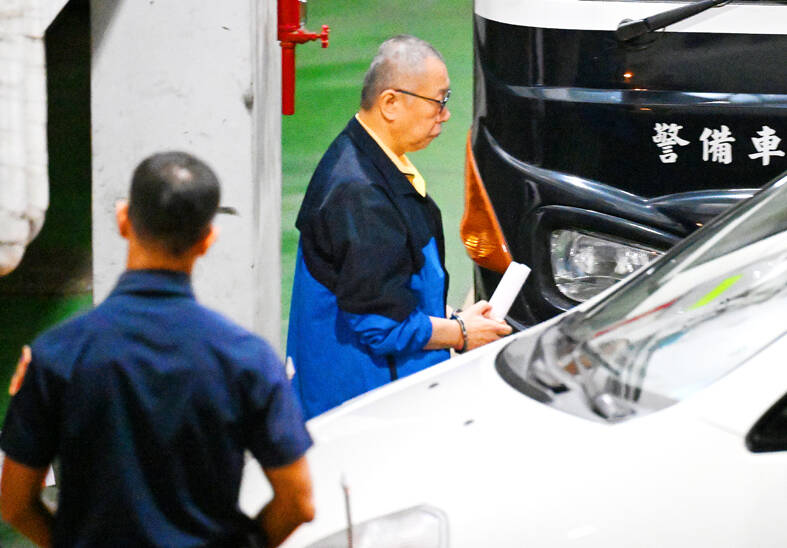The Taipei District Court yesterday approved the seizure of NT$38.83 million (US$1.19 million) from Muko Public Relations (木可行銷公關), a company associated with the Taiwan People’s Party (TPP), for alleged falsified accounting and unlawful transfer of funds for personal profiteering.
Taipei prosecutors also summoned former TPP chief financial officer Liang Hsiu-chu (梁秀菊) for questioning yesterday.
She was released afterward.

Photo: Liao Chen-huei, Taipei Times
TPP Chairman Ko Wen-je (柯文哲) was summoned on Tuesday for two questioning sessions, first in the morning by Taipei prosecutors, then in the afternoon by the Ministry of Justice Investigation Bureau (MJIB), which was investigating the party’s political donations and campaign funds money flow.
Taipei prosecutors in a release said they had filed an application to the Taipei District Court to seize Muko’s assets.
Prosecutors said they had uncovered numerous financial items that were supposed to be political donation campaign finances for Ko and the TPP, but were transferred to Muko accounts for alleged unlawful use by Ko and his family.
Set up in late 2022, Muko was located next to the TPP’s office in Taipei, and was managed by Lee Wen-chuan (李文娟), sister of Ko’s long-time friend, Lee Wen-tsung (李文宗).
The company handled donations for Ko’s presidential campaign, and earned revenue from Ko’s appearances, “concert events,” and sale of merchandise bearing the “kp” logo.
Muko is one of three private entities set up by Ko and his inner circle for receiving political contributions, Chinese Nationalist Party (KMT) Taipei City Councilor Yu Shu-hui (游淑慧) said.
TPP officials in a statement yesterday denied that Ko had misappropriated party funds.
After errors and missing account records were uncovered earlier this year, Ko instructed party members to double-check accounting reports and clarify the party’s finances to the public during a news conference in August, it said.

Taiwanese can file complaints with the Tourism Administration to report travel agencies if their activities caused termination of a person’s citizenship, Mainland Affairs Council Minister Chiu Chui-cheng (邱垂正) said yesterday, after a podcaster highlighted a case in which a person’s citizenship was canceled for receiving a single-use Chinese passport to enter Russia. The council is aware of incidents in which people who signed up through Chinese travel agencies for tours of Russia were told they could obtain Russian visas and fast-track border clearance, Chiu told reporters on the sidelines of an event in Taipei. However, the travel agencies actually applied

Japanese footwear brand Onitsuka Tiger today issued a public apology and said it has suspended an employee amid allegations that the staff member discriminated against a Vietnamese customer at its Taipei 101 store. Posting on the social media platform Threads yesterday, a user said that an employee at the store said that “those shoes are very expensive” when her friend, who is a migrant worker from Vietnam, asked for assistance. The employee then ignored her until she asked again, to which she replied: "We don't have a size 37." The post had amassed nearly 26,000 likes and 916 comments as of this

New measures aimed at making Taiwan more attractive to foreign professionals came into effect this month, the National Development Council said yesterday. Among the changes, international students at Taiwanese universities would be able to work in Taiwan without a work permit in the two years after they graduate, explainer materials provided by the council said. In addition, foreign nationals who graduated from one of the world’s top 200 universities within the past five years can also apply for a two-year open work permit. Previously, those graduates would have needed to apply for a work permit using point-based criteria or have a Taiwanese company

The Shilin District Prosecutors’ Office yesterday indicted two Taiwanese and issued a wanted notice for Pete Liu (劉作虎), founder of Shenzhen-based smartphone manufacturer OnePlus Technology Co (萬普拉斯科技), for allegedly contravening the Act Governing Relations Between the People of the Taiwan Area and the Mainland Area (臺灣地區與大陸地區人民關係條例) by poaching 70 engineers in Taiwan. Liu allegedly traveled to Taiwan at the end of 2014 and met with a Taiwanese man surnamed Lin (林) to discuss establishing a mobile software research and development (R&D) team in Taiwan, prosecutors said. Without approval from the government, Lin, following Liu’s instructions, recruited more than 70 software